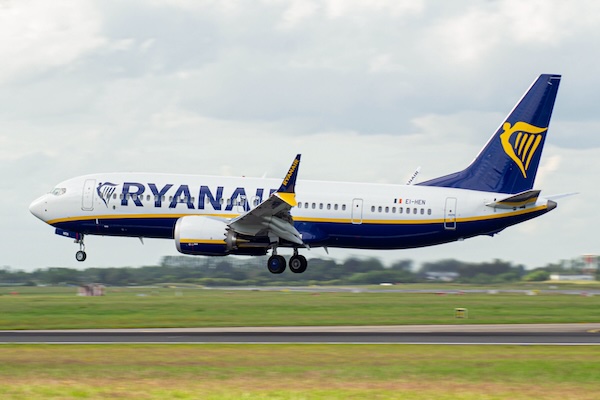Ryanair has encountered significant disruptions with 18% of its morning flights delayed, highlighting an ongoing issue with European air traffic control.
The airline attributes the delays to staffing shortages and management inefficiencies, which continue to strain operations across Europe despite a reduction in summer disruptions.
European Air Traffic Control Struggles
Ryanair, Europe’s largest airline, recently expressed frustration over what it called ‘unacceptable’ air traffic control (ATC) delays. These delays affected nearly 20% of its early Tuesday morning flights. According to Ryanair, the core issue stems from staff shortages within European ATC services, which have not been able to meet demand despite a decrease in flight volumes compared to 2019.
The airline noted a specific concern with the performance of the Maastricht control centre, indicating that operational challenges at this hub have been a consistent source of delay. Ryanair apologised to its passengers for the inconvenience, underlining that these delays are beyond its control and are symptomatic of broader issues plaguing European aviation.
Impact on Passengers and Airlines
The repeated delays have caused considerable disruption for passengers, inevitably eroding confidence in airline reliability. Ryanair, known for its no-frills approach, is faced with significant operational challenges due to these delays.
Travellers have taken to social media to express their dissatisfaction, sharing stories of missed connections and disrupted travel plans. Ryanair’s apologies, although sincere, often do little to assuage irritated passengers who are left waiting indefinitely. For airlines across Europe, these ATC delays threaten to undermine service commitments and operational efficiency.
Eurocontrol’s Perspective
Eurocontrol, the body responsible for coordinating air traffic management across Europe, acknowledges the pressing issues but highlights that solutions are neither quick nor simple. The organisation believes a comprehensive transformation of the air traffic management system is essential to address the current shortcomings.
Eurocontrol has stressed that pressure to cut costs has left ATC systems fragmented and understaffed, exacerbating the problem. They argue that a systemic overhaul is necessary to ensure sufficient numbers of qualified air traffic controllers, urging stakeholders to reconsider the current operational approaches to meet future demand adequately.
The organisation warns that without such changes, the reliability of air travel in Europe will continue to be jeopardised. They advocate for a unified approach to tackle these challenges, suggesting that only a collaborative stance can bring about the necessary improvements.
Ryanair’s Operational Adaptations
In response to these challenges, Ryanair has been exploring various operational strategies to minimise the impact of ATC-induced delays on its services. These include rerouting flights, adjusting schedules, and investing in technology solutions to enhance its ability to respond to real-time disruptions.
While these measures offer some relief, the airline acknowledges that only systemic improvements within ATC can provide a long-term solution. Ryanair continues to liaise with Eurocontrol and other airlines to advocate for necessary reforms within the air traffic management system.
Despite current frustrations, Ryanair remains committed to maintaining its service levels and enhancing customer satisfaction wherever possible, navigating through these operational headwinds with a focus on efficiency and adaptability.
Strategic Recommendations
Experts suggest that a coordinated effort between airlines, regulatory bodies, and governments is critical to addressing these systemic ATC issues. Enhanced investment in training and technology will be crucial to building a robust air traffic management system capable of supporting increasing flight volumes.
Industry stakeholders are advised to prioritise collaboration, ensuring that all parties are aligned in their objectives to streamline operations and enhance service reliability. Innovations in automation and real-time data analytics are among the potential areas for development to improve response times during ATC disruptions.
It is clear that a proactive approach will be necessary to mitigate the impact of these challenges on passengers and ensure operational consistency across Europe’s skies.
Ongoing Dialogue with Authorities
The conversation between airlines and air traffic authorities is ongoing, as the parties strive to find workable solutions to these complex issues. A commitment to transparent communication and shared responsibility is essential.
Both Ryanair and Eurocontrol recognise the importance of a unified strategy to effectively tackle ATC inefficiencies. Collaborative agreements are being explored to facilitate improvements in air traffic management.
Stakeholders are hopeful that through continued dialogue, the pressing challenges within European airspace can be addressed, paving the way for more reliable and efficient flight operations.
In conclusion, Ryanair’s recent challenges underscore the critical need for systemic reform within European air traffic management. Only through collaborative efforts can lasting solutions be realised.
The airline, while facing immediate operational hurdles, continues to advocate for the necessary changes to improve the current state of affairs. As discussions between key stakeholders progress, Ryanair remains vigilant in its pursuit of enhanced service delivery. A coordinated and strategic approach is essential to overcoming these industry-wide challenges.

